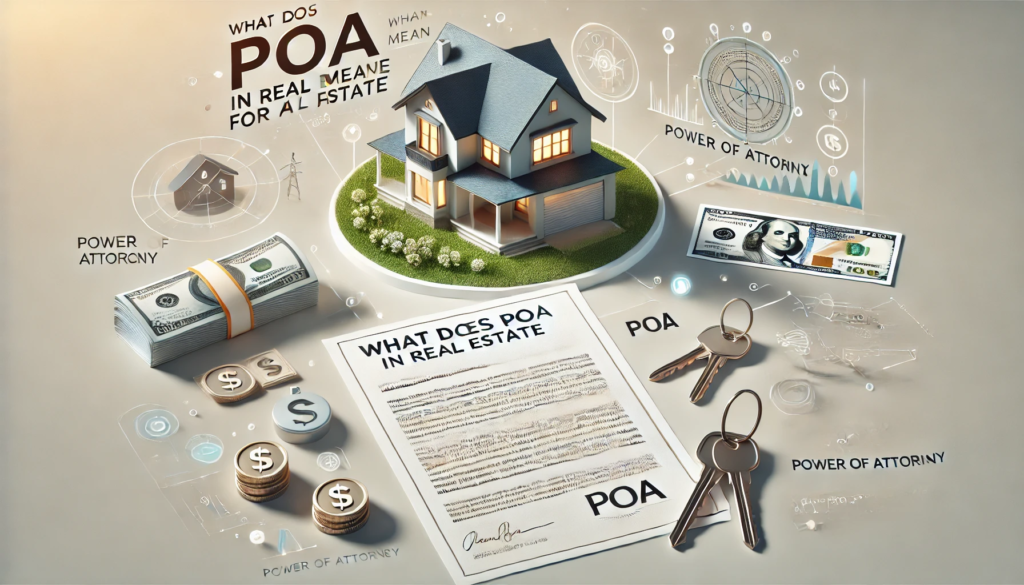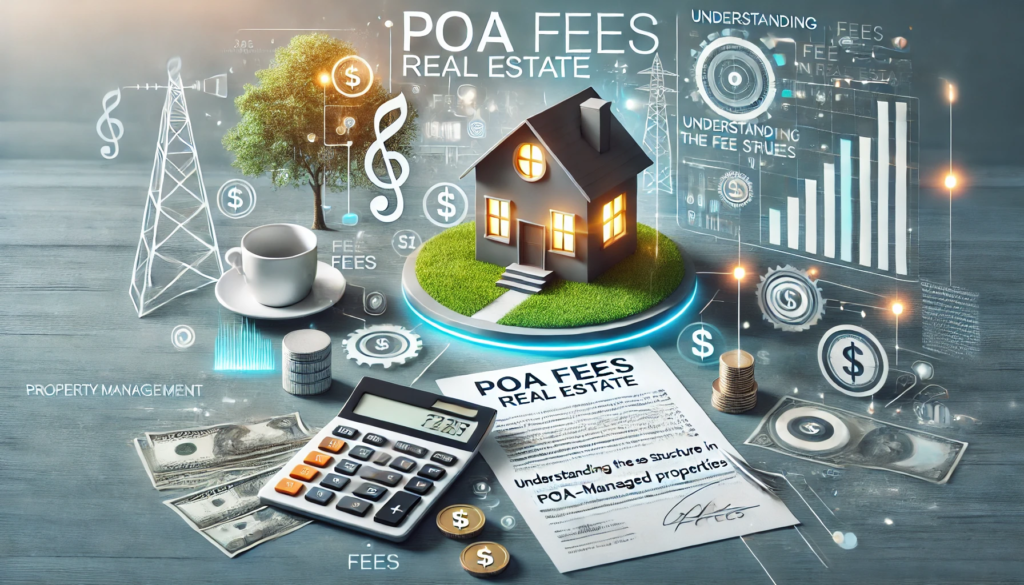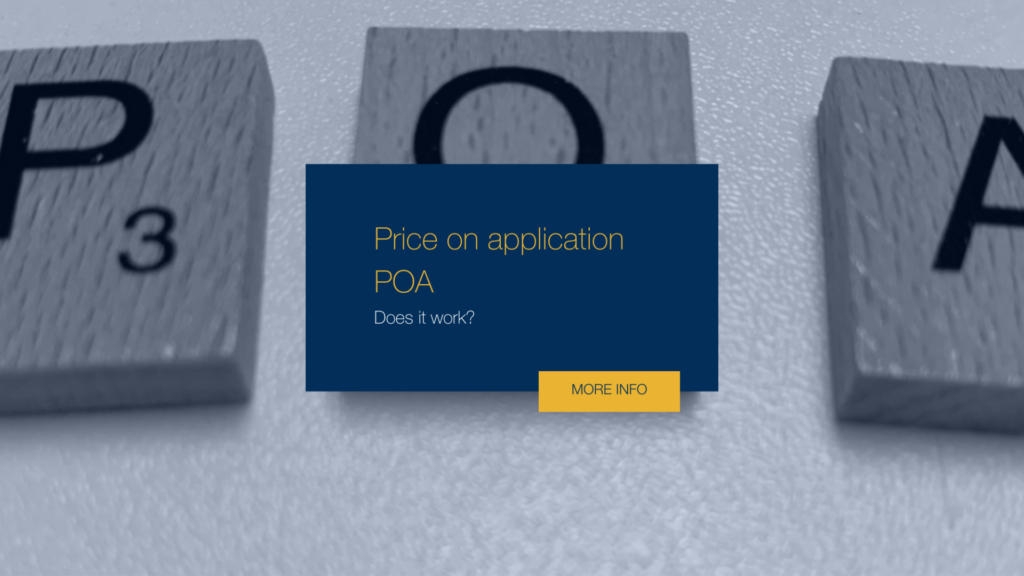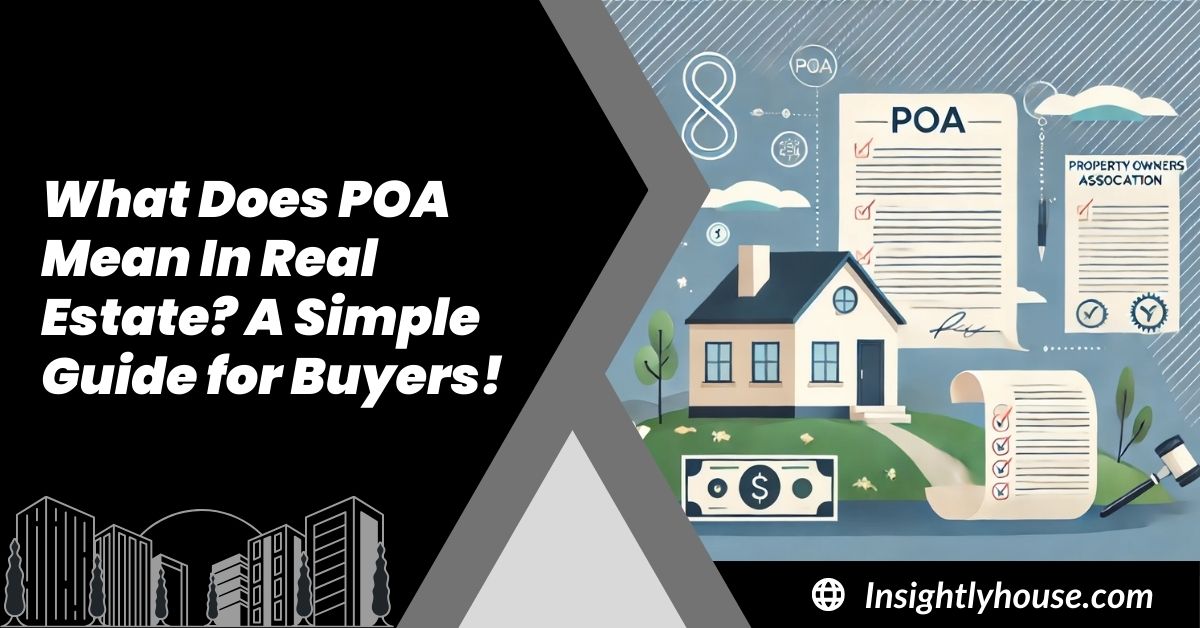In my search for the perfect home! I kept coming across the term “POA” in real estate listings. This knowledge helped me make an informed decision about where I wanted to live.
“POA” in real estate refers to a Property Owners Association, an organization in certain communities that makes and enforces rules for the properties and residents. Joining a POA often means paying fees that contribute to maintaining common areas and amenities.
Stay tuned as we delve into “What Does POA Mean in Real Estate?” a must-know for anyone navigating the housing market.
What Does POA Mean In Real Estate – POA Property Sale!
“POA Property Sale” refers to a real estate transaction where the Property Owners Association (POA) plays a significant role. This could involve specific rules and fees set by the POA that might affect the sale conditions and maintenance.

The Benefits of Joining a POA:
Joining a Property Owners Association (POA) comes with several benefits that can enhance your living experience in a community. Here are some key advantages:
- Enhanced Property Values: POAs help maintain a uniform and appealing aesthetic across the community, which can help to stabilize or increase property values over time.
- Access to Amenities: Members often enjoy exclusive access to community amenities such as pools, fitness centers, parks, and recreational areas.
- Community Engagement: POAs create a sense of community through organized events, meetings, and forums, providing residents with opportunities to connect and engage with neighbors.
- Dispute Resolution: POAs serve as a governing body that can help resolve disputes between neighbors regarding property use and community rules.
- Improved Security: Many POAs invest in security measures such as gated entries, surveillance cameras, and neighborhood patrols, contributing to a safer living environment.
What Does Poa Mean In Real Estate Example?
In real estate, “POA” stands for Property Owners Association a governing body that manages the communal aspects of a residential area. For example, if you purchase a home in a community with a POA you might be required to pay monthly or annual fees that contribute to the upkeep of shared spaces like swimming pools and tennis courts.
The POA also enforces community rules and standards that all residents must follow such as parking regulations or home color schemes.
Steps to Take When Disputing POA Decisions – Follow These Key Steps!
If you disagree with a decision made by your Property Owners Association (POA), you can follow these steps to resolve the dispute effectively:
Review the Governing Documents:
- Gather Evidence: Collect any relevant documentation, such as emails, notices, or meeting minutes, to support your case. Evidence is crucial when presenting your argument.
- Communicate Directly with the POA: Contact the POA board or property manager to discuss the issue. Be polite but firm, and explain your concerns with supporting evidence. Many disputes can be resolved through a direct conversation.
- Submit a Formal Complaint: If the issue remains unresolved, write a formal complaint to the POA board. Clearly outline the problem, reference the governing documents, and suggest a resolution.
- Request a Hearing: Many POAs offer a formal hearing process for disputes. Request a hearing to present your case to the board or a dispute resolution committee.
- Consider Mediation or Arbitration: If the dispute escalates, mediation or arbitration may be required. This involves a neutral third party helping to resolve the issue without going to court.
- Seek Legal Advice: If other options fail, consult an attorney with experience in HOA/POA matters. They can advise on legal recourse and represent you in further proceedings.
- File a Lawsuit as a Last Resort: Legal action should be a last resort, as it can be time-consuming and costly. Ensure you have a strong case before pursuing this option.
Read More: Best Commercial Real Estate Investing In 2025 – Expert Tips!
What Does POA Mean In Real Estate For A House?
In real estate, “POA” for a house typically stands for Property Owners Association. This refers to a governing body that manages a specific community or neighborhood to maintain its quality and standards. Here’s how it applies to a house:

Community Rules and Regulations:
The POA enforces rules that homeowners must follow, such as restrictions on exterior home modifications, landscaping, or parking. This ensures the community maintains a consistent and appealing appearance.
Fees or Dues:
Homeowners in a POA-managed community are required to pay monthly or annual fees. These funds are used for maintaining shared amenities, landscaping, security, and other communal benefits.
Access to Amenities:
A house within a POA community often comes with perks like access to swimming pools, clubhouses, parks, or fitness centers, which are maintained by the POA.
Dispute Resolution:
The POA serves as a mediator for disputes between homeowners or regarding community rules, ensuring harmony within the neighborhood.
Impact on Property Value:
Living in a POA-governed community can positively affect property values due to the maintained standards and amenities, but it may also limit a homeowner’s flexibility to make changes to their property.
What Does Poa Mean In Real Estate Florida?
It enforces rules outlined in covenants, conditions, and restrictions (CC&Rs) and ensures shared amenities like pools. Florida POAs also collect fees from homeowners to fund these services.
Specifically for Florida real estate, a Florida Real Estate Power of Attorney (FREPOA) allows an authorized agent to:
- Sign deeds.
- Execute mortgage documents.
- Sign lease agreements.
- Handle property-related legal transactions.
Key Requirements for a Florida POA
- The principal must be at least 18 years old.
- Must be a written document.
- Requires two adult witnesses.
- Must be notarized.
- Specifies exact powers granted to the agent.
How Does POA Impact Property Sales And Transactions?
- Rules and Regulations: A POA can impose restrictions that affect property sales, such as rules on home aesthetics, renovations, or tenant policies. Buyers must agree to these terms before purchasing.
- Disclosure Requirements: Sellers are often required to disclose POA rules, fees, and special assessments to potential buyers. This transparency can influence buyer interest.
- Fees and Assessments: POA fees are mandatory for property owners, which can impact a buyer’s budget and the property’s overall affordability.
- Lien Authority: If a seller hasn’t paid POA dues, the association may place a lien on the property, delaying or complicating the transaction until it’s resolved.
- Appeal to Buyers: A well-managed POA can increase property desirability due to maintained amenities and property values, positively impacting sales.
Read More: Boost Leadership With Pedrovazpaulo Executive Coaching!
POA Fees Real Estate – Understanding the fee structure in POA-managed properties!
While similar to HOA fees, POA fees can vary significantly based on the specific community and services provided.

Fee Structure and Typical Costs:
POA fees generally range from $100 to $700 per month, with several factors influencing the total cost:
| Property Type | Typical Monthly Fee |
| Single-family home | $200 – $300 |
| Upmarket properties | $500 – $700 |
| Basic community | $100 – $200 |
What POA Fees Typically Cover:
POA fees are used to fund:
- Common area maintenance
- Landscaping
- Community infrastructure
- Shared amenities (pools, parks, clubhouses)
- Administrative costs
- Reserve funds for major repairs
How to Determine POA Fees for Your Property?
Review the community’s bylaws, covenants, and budget provided by the POA for details on fee amounts and allocation. Reach out to the association to confirm the current fees, and frequency of payment (monthly, quarterly, annually).
Research POA fees in neighboring communities to understand whether your fees are competitive or unusually high.
The Ultimate Comparison – POA vs. HOA for Homebuyers!
Property Owners Associations (POAs) and Homeowners Associations (HOAs) have distinct characteristics that set them apart in real estate management.
| Feature | POA (Property Owners Association) | HOA (Homeowners Association) |
| What It Covers | Handles both homes and businesses. | Focuses only on homes. |
| Property Types | Includes homes, offices, and shops. | Only for houses, condos, or townhomes. |
| Rules | Sets rules for all property types, even businesses. | Sets rules for homes, like how they look or are maintained. |
| Fees | Pays for roads, offices, and shared spaces. | Pays for parks, pools, and landscaping. |
| Who Manages It | A larger board for many property types. | A smaller board, chosen by homeowners. |
Legal Obligations and Rights Under a POA – A Must-Read Guide!
When living in a property governed by a Property Owners Association (POA), both homeowners and the POA have specific legal obligations and rights:
Homeowner Obligations:
- Follow Community Rules: Homeowners must comply with the POA’s Covenants, Conditions, and Restrictions (CC&Rs).
- Pay Fees: Regular dues and any special assessments must be paid on time to fund community upkeep and improvements.
- Request Approval for Changes: Any significant changes to the property, like exterior renovations, often require POA approval.
- Attend Meetings: Homeowners may need to participate in community meetings and vote on issues affecting the neighborhood.
Homeowner Rights:
- Access to Documents: Homeowners have the right to view the POA’s financial records, budgets, and governing documents.
- Fair Treatment: The POA must enforce rules equally and cannot discriminate against any homeowner.
- Dispute Resolution: Homeowners can dispute decisions or fines through the POA’s internal processes or legal channels if necessary.
- Vote on Decisions: Homeowners can vote on key issues, such as changes to fees or community rules, during POA meetings.
POA Obligations:
- Maintain Community Standards: The POA must ensure the neighborhood is well-maintained and managed according to its rules.
- Use Fees Appropriately: Collected dues must be spent on agreed-upon community expenses and improvements.
- Transparency: The POA is required to provide clear information about finances, decisions, and meeting outcomes.
- Conflict Resolution: The POA must provide a fair process for resolving disputes with homeowners.
POA Rights:
- Enforce Rules: The POA has the right to enforce community rules and issue fines or penalties for violations.
- Collect Fees: The POA can take legal action to collect unpaid fees, including placing liens on properties.
- Amend Rules: With homeowner approval, the POA can modify CC&Rs to adapt to changing community needs.
Read More: Lessinvest.Com Real Estate – 2025’s Best Investment Option!
Impact of POA on Property Values – The Hidden Truth Revealed!
A Property Owners Association (POA) can significantly influence property values, both positively and negatively. Here’s how:

| Positive Impacts | Negative Impacts |
| Keeps Neighborhood Nice: Makes sure homes and yards are well-maintained. | High Fees: Expensive payments may turn buyers away. |
| Adds Amenities: Offers things like pools, parks, and clubhouses that people love. | Strict Rules: Too many rules can make living there hard for some people. |
| Uniform Look: Keeps all homes looking neat and similar, which attracts buyers. | Extra Costs: One-time surprise fees for repairs can upset homeowners. |
| Improves Safety: Adds gates, cameras, or security guards to make the area safer. | Bad Reputation: If the POA has issues or fights with homeowners, it can hurt home values. |
| Builds Community: Creates events and shared spaces that make people feel welcome. | Poor Management: If the POA is disorganized, it can lower the appeal of the neighborhood. |
6 Myths You Need to Stop Believing – Common Misconceptions About POA in Real Estate!
These misconceptions can often lead to confusion, so understanding the facts about POAs is essential for homeowners and buyers.
- POAs Are the Same as HOAs: While similar, POAs manage both residential and commercial properties, while HOAs focus only on homes.
- POA Fees Are Always Expensive: Fees vary depending on the community and amenities, and not all POAs have high dues.
- POAs Take Away Your Property Rights: POAs enforce rules, but they don’t own your property; their goal is to maintain community standards.
- All POAs Have Strict Rules: Some POAs are more flexible and focus only on essential guidelines for the neighborhood.
- POAs Only Benefit the Association: The fees collected are used for community improvements, amenities, and property value preservation.
- You Can Ignore POA Rules: Homeowners must follow the rules set in the governing documents, as they are legally binding.
FAQs Related To What Does POA Mean In Real Estate:
What Does Poa Stand For?
POA stands for Property Owners Association, which is an organization that manages and enforces rules for a community of property owners. It ensures the neighborhood is well-maintained.
What Does Poa Price Mean?
It is used when the seller chooses not to display the price publicly and requires interested buyers to contact them for details. This is often done for flexibility or privacy.
What Does Poa Mean In Real Estate Terms?
In real estate, POA can refer to either a Property Owners Association, which oversees community rules and amenities, or Price on Application, indicating a price that is not disclosed upfront. It depends on the context of the property listing.
What Is A Poa In A Neighborhood?
It enforces rules outlined in the covenants, conditions, and restrictions (CC&Rs) to ensure a uniform appearance and harmonious living environment. Homeowners in a POA neighborhood pay regular fees to cover services like landscaping, security, and upkeep of amenities like parks or pools.
What does POA mean in a homeowners association?
It manages the community, enforces rules, collects fees, and maintains shared amenities to ensure property values and community standards are upheld.
Can a POA sell the house?
A Power of Attorney (POA), not a Property Owners Association. It can sell a house if the homeowner has legally authorized them to act on their behalf. This document gives someone the legal authority to handle property transactions for the owner.
What is a POA for closing?
A Power of Attorney (POA) for Closing allows a designated person to sign documents and complete the real estate closing process on behalf of the buyer or seller. This is often used if the homeowner cannot attend the closing in person.
Conclusion About What Does POA Mean In Real Estate!
Whether you’re purchasing a property in a POA-managed community or dealing with property transactions involving POA rules and fees. From maintaining property values and offering amenities to enforcing community rules and resolving disputes, a POA plays a significant role in shaping your living experience.
While POA fees and regulations can vary, the benefits of living in a well-managed POA community, including enhanced security, better upkeep, and a strong sense of community, are undeniable.
Must Read:
- Brandon Miller Real Estate – From Success to $34M in Debt!
- California Department of Real Estate – Updates for Beginners!
- Pedro Vaz Paulo Real Estate Investment – Easy Ways to Build Wealth!
